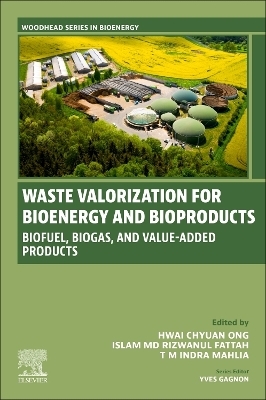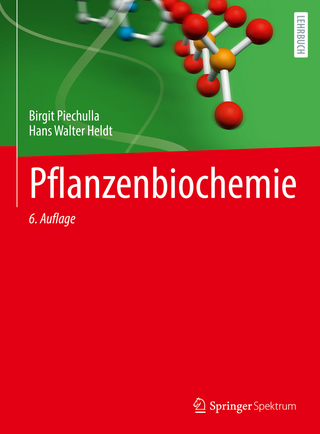
Waste Valorization for Bioenergy and Bioproducts
Woodhead Publishing (Verlag)
978-0-443-19171-8 (ISBN)
Other sections discuss Biogas derived from any of the above feedstock streams such as landfill gas. Each chapter critically examines the challenges and opportunities in the production of waste-to energy processes, along with addressing the acceptability and marketability of transforming wastes into value-added products.
Professor Hwai Chyuan Ong is a Chartered Engineer (CEng) registered with the Engineering Council, UK. He currently serves as a Distinguished Professor at Department of Engineering, School of Engineering and Technology, Sunway University, Malaysia, and as an Adjunct Professor at Faculty of Engineering & IT, University of Technology Sydney, Australia. His research interests are energy & fuel, biomass energy, renewable energy, circular economy and waste management. With a prolific publication record, he has authored over 250 high-impact SCI journal papers and delivered numerous keynotes, plenary, and invited talks at international conferences. He has successfully secured and completed several grants as a principal investigator from government, industry, and private entities both nationally and internationally. Recognized as a Highly Cited Researcher (Engineering) by Clarivate Analytics from 2019 to 2022, he was also named Australia’s top early career researcher in sustainable energy in 2021. In 2018 and 2017, he received Malaysia's Research Star Award (frontier researcher), and in 2016, he was honored with Malaysia's Rising Star Award (young researcher) by the Ministry of Higher Education and Clarivate Analytics. Currently, he serves as Associate Editor of Critical Reviews in Environmental Science and Technology, Alexandria Engineering Journal and e-Prime. Ong is also a Core Group Member of APRU Sustainable Waste Management (SWM) program. Dr. IMR Fattah is a 'Highly Cited Researcher', ranked among the top 0.1% globally in the "Cross Field" category by Clarivate Analytics. He has received this prestigious recognition for two consecutive years: 2023 and 2022. Additionally, Elsevier BV and Stanford University have named him one of the "Top 2% of Scientists in the World" for an impressive four consecutive years, from 2020 to 2023. Currently, Dr. Fattah holds a Research Fellow position at the University of Technology Sydney (UTS) within the School of Civil and Environmental Engineering. His research focuses on unlocking the potential of waste materials for sustainable energy applications. This passion stems from his PhD, completed in 2019 at the University of New South Wales (UNSW, Sydney), where he investigated methods to reduce emissions, particularly PM/soot, from diesel combustion. Prior to his doctoral studies, he earned a Master of Engineering Science from the University of Malaya (UM) in 2014 and a Bachelor of Science in Mechanical Engineering from the Bangladesh University of Engineering and Technology (BUET). Dr. Fattah is an active contributor to his field, having published over 150 articles and garnering nearly 9500 citations for his work. He also serves as an Associate Editor for three esteemed journals: Frontiers in Energy Research, Frontiers in Catalysis, and the Journal of Energy and Power Technology. Dr. IMR Fattah's unwavering commitment is to remain at the forefront of research in renewable and sustainable energy, continuously pushing the boundaries of knowledge and innovation. Professor T.M. Indra Mahlia, a distinguished Australian engineer and Highly Cited Researcher in the field of Engineering, currently serves as a Distinguished Professor at the School of Civil and Environmental Engineering at the University of Technology Sydney (UTS). He is also a key core member of UTS's prestigious Centre for Water and Wastewater Technology (CTWW). Professor Mahlia's research interests span a broad spectrum, encompassing Energy and Fuels, Techno-economic Analysis, the Water-Energy Nexus, Life-Cycle Costing, Cost-Benefit Analysis, and the Circular Economy. His dedication to advancing knowledge in these fields has secured over $5 million in funding from government and industry organizations for numerous projects. Professor Mahlia's exceptional scholarly achievements have been consistently recognized. From 2017 to 2022, Clarivate Analytics named him a Highly Cited Researcher in Engineering. The Australian further acknowledged his leadership in Sustainable Energy (Engineering & Computer Science) in a special report published in 2019. Since assuming his role as a Distinguished Professor at UTS in 2018, Professor Mahlia has demonstrated a strong commitment to mentoring early-career researchers. His guidance and support have played a pivotal role in fostering the success of his students and fellows. Notably, two of his former PhD students and two Postdoctoral Fellows have been distinguished as Highly Cited Researchers in Engineering and Cross-Field, a testament to his profound influence and impactful mentorship
1. Introduction to Waste to Bioenergy
2. Opportunities and challenges in the production of biofuels from waste
3. Pretreatment Technologies for industrial substrate deconstruction
4. Technologies to convert waste to bio-oil, biochar, and biogas
5. Energy recovery from waste biomass through gasification
6. Bio-oil production from waste and waste plastics
7. Bio-oil production from plastics and microplastics wastes
8. Syngas from residual biogenic waste
9. Fermentable Sugars from Agricultural wastes
10. Bioethanol production from residues and wastes
11. Butanol Production from lignocellulosic biomass wastes
12. Overview of biodiesel production from liquid waste
13. Biodiesel production from Municipal waste
14. Thermochemical Conversion of Microalgae into Biofuels
15. Production of Liquid Biofuels from microalgal biomass waste
16. Fuel and value-added chemical production from biodiesel by-product Glycerol
17. Biohydrogen production from bagasse from the sugarcane industry
18. Gas-to-liquids from biogas and landfill gases
19. Dry reforming of methane (DRM) from biogas
20. Lignocellulosic Waste Valorisation and Biorefineries Concept
21. Life cycle perspective assessment of waste-based biofuels
22. Life Cycle Assessment applied to waste-to-energy technologies Glossary
| Erscheinungsdatum | 03.01.2024 |
|---|---|
| Zusatzinfo | Approx. 122 illustrations (93 in full color); Illustrations |
| Sprache | englisch |
| Maße | 152 x 229 mm |
| Gewicht | 1000 g |
| Themenwelt | Naturwissenschaften ► Biologie ► Biochemie |
| Naturwissenschaften ► Chemie ► Technische Chemie | |
| Naturwissenschaften ► Physik / Astronomie ► Thermodynamik | |
| Technik ► Elektrotechnik / Energietechnik | |
| ISBN-10 | 0-443-19171-9 / 0443191719 |
| ISBN-13 | 978-0-443-19171-8 / 9780443191718 |
| Zustand | Neuware |
| Haben Sie eine Frage zum Produkt? |
aus dem Bereich


